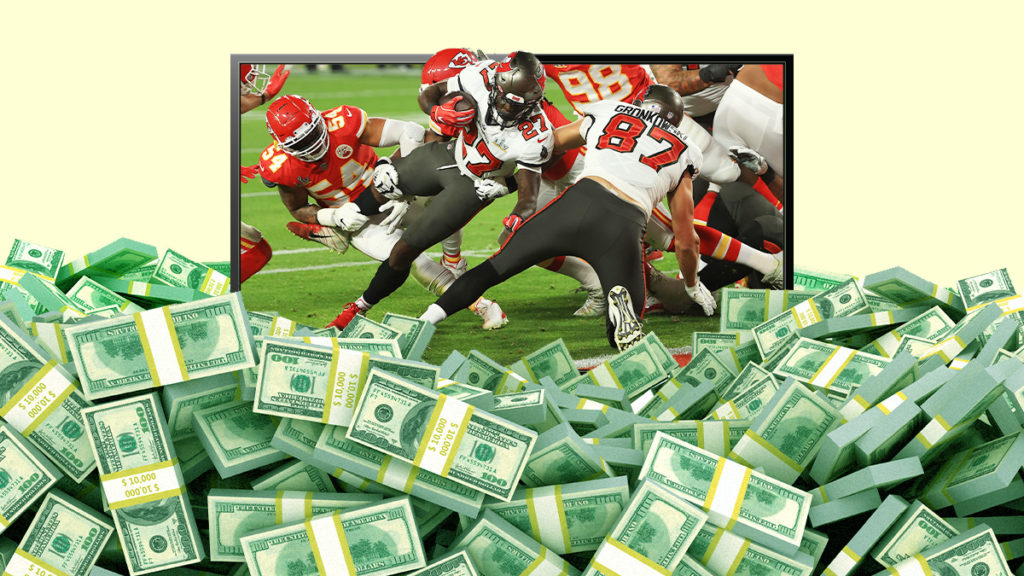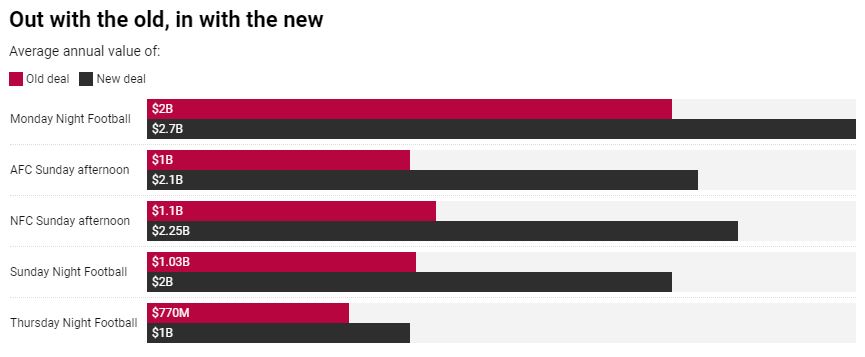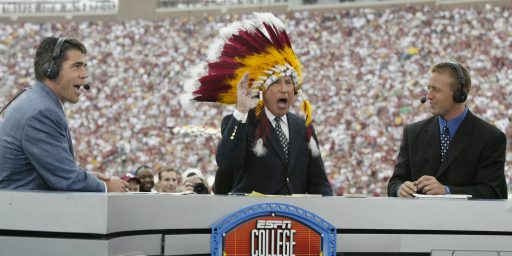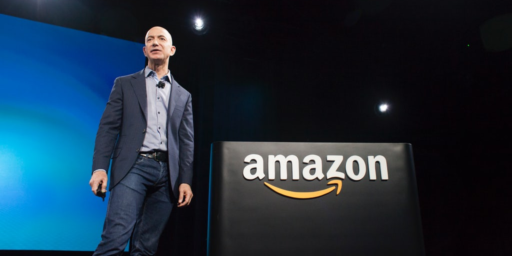The NFL’s $10 Billion TV Deal
Pandemic-induced recession? What pandemic-induced recession?

With March Madness kicking off, yesterday’s announcement of the NFL’s new broadcast deals has gotten less attention than it might otherwise have. Given an economy that ostensibly required another $1.9 trillion in stimulus, the fact that the League looks to more than double its take is truly remarkable.
ESPN‘s report (“NFL announces TV deals with ESPN/ABC, NBC, CBS, Fox, Amazon“) from yesterday afternoon was curiously bereft of financial numbers:
The NFL announced a new set of national television deals Thursday, keeping games on ESPN/ABC, Fox, CBS, NBC, Amazon and NFL Network through the 2033 season.
The agreement keeps Sunday afternoon games on CBS and Fox, Sunday night games on NBC and Monday night games on ESPN, with some games also airing on ABC. For the first time, Amazon will be the exclusive home for Thursday night games, which will also be on over-the-air channels in the competing teams’ home markets. NFL Network will also air select games.
ABC picks up two Super Bowls during the deal — the first in 2026 — with the other networks airing three each.
ESPN’s package adds six games to the network during the season. There will be three Monday night doubleheaders — with games on ESPN, followed by a game on ABC. There will also be a Saturday doubleheader during the season’s final weekend and one Sunday morning game streaming nationally on ESPN+.
ESPN, which has previously aired a wild-card playoff game, will add one game in the divisional round as well.
For the first time, ESPN’s Monday Night Football will be able to “flex” games, starting with Week 12 of the season, to ensure better matchups. ESPN’s package also includes the ability to include four teams up to two times each.
ESPN will also continue to televise the NFL draft, as it has since 1980, and the Pro Bowl. NFL PrimeTime will also return to ESPN+ on Sunday nights, streaming throughout the week.
“When ESPN and the NFL work best together, the results are transformational for sports fans and the industry,” ESPN and sports content chairman Jimmy Pitaro said in a statement. “Some of the most remarkable collaborative examples have occurred in the past 12 months and have demonstrated the extraordinary range of The Walt Disney Company that is fundamental to this agreement. There are so many exciting new components, including Super Bowls and added playoff games, new end-of-season games with playoff implications, exclusive streaming games on ESPN+, scheduling flexibility and enhancements, and much more. It’s a wide-ranging agreement unlike any we’ve reached with the NFL, and we couldn’t be more energized about what the future holds.”
AdWeek‘s Jason Lynch (“NFL Sets Huge New TV Deals With CBS, Fox, NBC, ESPN/ABC and Amazon Prime Video“) filled in some blanks:
The new Disney deal is estimated at around $2.7 billion per year, according to the Wall Street Journal, up from the current $2 billion pact. Fox, CBS and NBC have all roughly doubled their current deals (Fox’s averaged $1.1 billion per year, CBS’ was $1 billion and NBC’s was $950 million), while Amazon’s deal is estimated at $1 billion annually.
One big NFL deal remains up for grabs: the NFL Sunday Ticket, which is currently with DirecTV through the 2022 season, but is expected to go to a streaming service.
John Ouran and Ben Fischer break it down more thoroughly for Sports Business Journal (“NFL’s $10 billion media rights deals send jaws dropping and rattles the market for others“):

It’s breathtaking to consider the numbers the NFL raked in. Fox more than doubled its rights fee to $2.25 billion per year; CBS saw its rights fee double to $2.1 billion; and NBC came close to doubling its rights fee to $2 billion. ESPN got the best deal — only a 35% increase. But it’s still paying an eye-popping $2.7 billion per year.
Why did the media companies pay such big increases? Executives with each of the networks are quick to point out that the deals include many new rights, particularly with streaming.
“It’s much bigger than a broadcast deal now,” said CBS Sports Chairman Sean McManus. “It confirms the importance of broadcast television, but also acknowledges the enormous growth opportunity for our streaming product.”
The NFL is far and away the most-watched content on American television, pretty much dominating the ratings from top to bottom. Indeed, a random Thursday Night game between mediocre teams will routinely outdraw NBA Conference Finals games featuring LeBron James.
Ouran and Fischer argue that the League and its owners won big time, securing their fortunes. ESPN won, too, because they managed to pay only a relatively modest increase in rights fees for much better content. (Monday Night Football, once the crown jewel of regular season NFL coverage, has long since been supplanted by Sunday Night Football and MNF was consistently getting dud games, with some charging the League was deliberately punishing ESPN for unfavorable reporting on its news programs.)
They also assess cord-cutters the winners because, “This deal enables most every NFL game to be available on one streaming service or another, giving fans without cable or an antenna better options.”
Among the losers:
DirecTV
It’s no surprise that Sunday Ticket was not included in this deal — the NFL has been consistent in saying that it wanted to wait to finalize its Sunday afternoon deals before turning its attention to its out-of-market package. When those negotiations start up in full, DirecTV not only will find a lot of competition from streaming platforms, it will be dealing with a league that has made a big bet on the future of streaming, judging by the fact that almost every game will be available via a streamer.Ticket holders
The expansion of flex scheduling to include “Monday Night Football” will make it more difficult than ever for fans to plan around the in-person NFL experience. Imagine making plans to attend an out-of-town game one weekend only to find that the game is moved to Monday night.
From a strict utilitarian viewpoint, privileging the hundred million or so people who will watch a game on television or a streaming device over the hundreds of thousands who will see games in person makes sense. But it’s definitely a flip of the switch on the old business model, which long enforced television blackouts in markets where stadia weren’t sold out.
Beyond that, Ourand and Fischer note that the NFL isn’t done cashing in, with several more streams yet to be settled:
■ Negotiate a new deal for the out-of-market “Sunday Ticket” package, which is widely expected to leave DirecTV and land with a streaming service. DirecTV is paying $1.5 billion annually for the deal that expires after the 2022 season.
■ Sign an exclusive gambling data deal, a contract expected to reach well into the eight figures. Sportradar is the incumbent and the favorite, insiders say, but Genius Sports is competitive. The league also expects to sign its first sportsbook sponsorship deal, becoming the last major league to fill that category.
■ Renew or find new sponsors in seven big-ticket categories currently worth more than $1 billion annually combined: Beer (A-B InBev); pizza (Pizza Hut); hotels (Marriott); headphones/consumer electronics (Bose); and PepsiCo’s three deals (Pepsi in soft drinks, Frito-Lay in salty snacks, and Gatorade in sports drinks).
■ Owners will likely approve a 17th game at league meetings March 30-31, the first expansion of the regular season since 1978. That will push the Super Bowl to Feb. 13 (but not to Presidents Day weekend), cut one preseason game from the calendar, and generate at least $110 million in new ad revenue for networks, based on five windows in the last week of the season that generated $22.1 million in revenue on average in 2020, according to Standard Media Index estimates. Once the new media deals are in effect, the added game will also trigger a “media kicker” for players, whose share of revenue will increase from 48% to 48.5%, pushing the salary cap higher.
Good work if you can get it, I guess.






Not to turn this into local sports radio, but your last point is going to be a doozy. Bigger money equals higher salary cap…which means that there is going to be a handful of jaw-dropping contracts for top players, at the end of the 2021 season.
For the American masses, pro football is their opiate (Go Giants)….
@Long Time Listener: Yup. Especially since the cap was artificially constrained this year owning to the pandemic year.
I am totally not a sports guy (complete outlier compared to a lot of Americans, and even folks around the world who love their sports, I barely watch any sports games at all, but stuff like the Golf Master tourney might run in the background of my futzing on my tablet on a Sat. afternoon), but I do tend to read up on stories like those involving negotiation’s between Disney (ESPN) and the Football/Baseball folks and a couple weeks back I caught a story that said that Disney was playing a bit of hardball with the NFL because they balked at the idea of paying double for continue rights to NFL content as they were already paying more than other Networks so they wanted better terms (and it was pointed out in the article that this was indeed true that Disney was already spending a ton for football).
Clearly, Disney/ESPN and the NFL came to a compromise as paying 35% more for right is a far cry from the near or 100%(!!) jump in fees that folks like Fox have to now pay out. As this article makes clear, what Disney/ESPN is paying is still an eye-popping number and explains why my cable bill is so high.
Tons of non-sports folks are definitely helping foot the bill as a good chunk of my cable costs goes towards content I ignore.
I remember many years (well over 16 years) back that a guy at a party at my brother’s family home brought up that he wished he could pay a la carte for cable so he did not have to pay for stuff like PBS/Sesame Street and what I said next pretty much shut down the conversation and we moved on to other things to discuss, as I said that what I am paying to help keep stuff like PBS on the air is nothing compared to what I contribute to help keep sports on the air. I said that cable companies would not want me to go with an a la carte package that does not have me contributing money to help pay for sports so while a la carte sounds fair in practice (you like sports, you pay for sports not PBS, I do not like sports so I do not pay for them on my tv) it would be tricky for Cable companies because they need us non-sports folks to help pay for the sports licenses.
At that time someone like ESPN was probably paying hundreds of millions (vs the now Billions, how times have changed) for sports and my cable bill breakdown would show I pay a good chunk every month for content I do not touch with a 10ft pole but I bet what I contribute towards keeping PBS on the air was paltry compared to my sports license contribution.
Like I said, that shut down the conversation because I was right. Also, now that we have a lot of a la carte choices (at least for the streaming services) folks are finding that they are not saving as much as they thought being able to pick and choose what content they want to pay for.
If you are an avid sports watcher who whined about helping pay to keep PBS on the air, well…honestly, it made you sound kind of pathetic. This article is proof in the pudding as to why my xfinity bill will remain high and I just suck it up and accept that my bill would go down by $20-30 dollars in a perfect world where I was allowed to stop paying for sports. I get enough value from the other stuff I pay for that I just accept paying for sports as part of the cost of doing business.
@inhumans99: in order to pay for the infrastructure and return on investment for their shareholders, cable companies have to get about 75 bucks out of you a month. So even if you went to some kind of à la carte system and only wanted like five channels, they’d just charge you $15 a channel.
I’m paying~$17/ month for YouTube premium—YouTube minus advertisements—and it’s been great. (I also pay about $45 a year for protonmail, email with no ads or data mining) Ads fucking suck.
I really like to watch NFL games, though my interest faded significantly when the Chargers stiffed San Diego for a new stadium.
But, holy cow, it’s staggering the amount of money generated and expended so a bunch of modern day gladiators can play a game for people’s entertainment.
Anybody with a little savvy can ignore the streaming services for sports and find any number of off shore websites that give you access to live telecasts of almost every sporting event in the world. The site I use has literally every NBA, NFL, MLB, Premiership, Champions League, Europa League, Golf (US, European), WTA, SerieA, Bundesliga, La Liga, Ligue 1, etc.
I just checked, and I could be watching Leeds vs Fulham in the premeriship right now, or Las Palmas vs Girona from the Spanish 2nd Division, or the LA Angels vs Kansas City in MLB. Later, I can watch Oregon State vs Tennessee in the NCAA Basketball Playoffs.
I won’t pay for the NFL Pass. I won’t pay for the NBA Pass. I think paying for Youtube.TV, Netflix, Hulu, Peacock, Disney+, Amazon Prime, Crackle, and AppleTV+ is enough.
@inhumans99: @Teve: I don’t mind the ads as much as Teve does, so I can manage to do streaming service for about $6.99/month, now that I got rid of CBS All Access/Paramount+ because in 5 attempts to reset my account the only help I could get from them was a robo-response suggesting that I check their “Troubleshooting Tips” link. As I noted in my letter, the 4 or 5 hours of live TV I used from their site every week wasn’t worth the trouble that keeping the service was creating. I’m thinking of getting DC Universe for a little while. Has anyone tried it?
@EddieInCA: You pay for Crackle? I get it for free. (Are you one of those “I hate ads so much that I’ll pay anything not to see them” guys?)
@James Joyner:
As opposed to the “natural” salary cap in a normal year?
[I’ll skip the rant about government-subsidized cartels and collusion deleted. Y’all can take it as read.]
@Just nutha ignint cracker:
You are 100% correct, sir. I do not pay for Crackle. But I did have to sign up, so I added that to my list without remembering I get it for free. But I forgot another one I pay for, which is Paramount+.